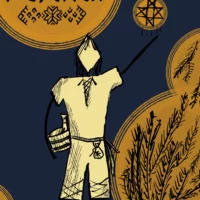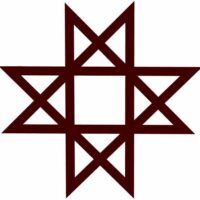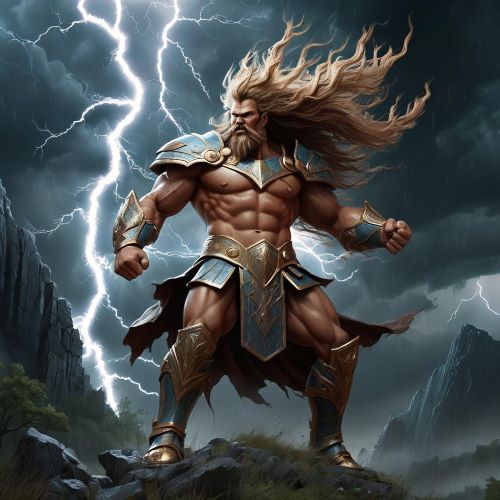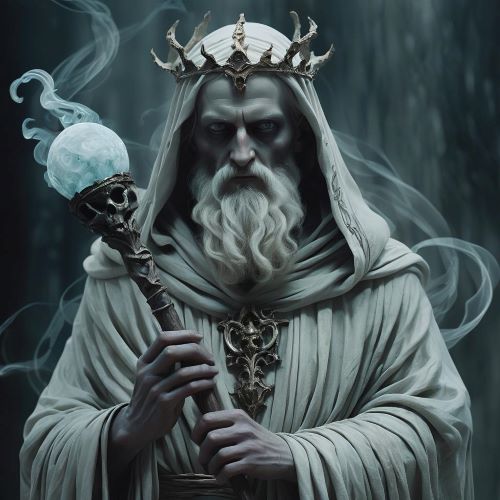Auseklis : God of the Morning Star
Listen
At a glance
| Description | |
|---|---|
| Origin | Baltic Mythology |
| Classification | Gods |
| Family Members | Saule (Mother) |
| Region | Latvia, Lithuania |
| Associated With | Morning Star, Light, Dawn |
Auseklis
Introduction
Auseklis, a deity deeply rooted in Baltic mythology, embodies the essence of dawn, light, and celestial influence. Across Latvian and Lithuanian traditions, Auseklis is revered with unique perspectives and interpretations, highlighting the deity’s multifaceted role and symbolism within the cultural tapestry. Known as the Morning Star, Auseklis occupies a distinctive position in Baltic folklore, representing celestial beauty and cosmic guidance. The name “Auseklis,” translating to “the dawn bringer” or “the morning star,” underscores this deity’s association with the transformative power of the sunrise.
In Latvian mythology, Auseklis is predominantly featured in traditional folk songs known as dainas, which contribute to a nuanced understanding of the deity’s character. Despite occasional obscurities in details, Auseklis emerges as a celestial being embodying hope and renewal, symbolically heralding the dawn of a new day. This portrayal within dainas enriches the mystical aura surrounding Auseklis, elevating the deity to an emblem of cosmic significance within Baltic cultural heritage.
Physical Traits
In Baltic mythology, detailed physical descriptions of deities like Auseklis are not commonly found. However, Auseklis is strongly associated with celestial bodies and the concept of dawn, symbolizing the transition from darkness to light. Due to the reliance on folk songs for mythological narratives, there are no concrete descriptions of Auseklis’ physical appearance. Nevertheless, his connection to the morning star, often identified as Venus, suggests an association with beauty and brilliance. Imaginatively, Auseklis might be envisioned adorned with starlight or emitting an ethereal glow, reflecting the celestial realm he embodies.
Depictions of Auseklis vary across Baltic traditions, maintaining certain consistent themes. Auseklis is commonly imagined as a radiant figure, shimmering with the light of a thousand stars. Often depicted as youthful and dynamic, Auseklis embodies the vitality and freshness of the morning sky. In certain narratives, Auseklis is linked with celestial motifs such as wings or shimmering attire, symbolizing a profound connection with the heavens. This imagery mirrors the breathtaking spectacle of the morning star, sparking wonder and inspiration in those who contemplate the skies above.
Family
Auseklis is intricately connected with Mēness, the Moon deity, and Saule, the Sun deity, often referred to collectively as Dieva dēli, or “sons of God.” Within the complex Baltic pantheon, Auseklis’s familial relations highlight elaborate cosmic narratives. While specific familial ties may vary, Auseklis is sometimes regarded as a child of Saule—the Sun Goddess—or as a sibling to celestial beings like the Moon. This interconnected familial network underscores the celestial mechanics observed in the natural world, weaving together themes of light and darkness, day and night.
In Latvian mythology, Auseklis’s family ties are deeply interwoven within the pantheon. Notably, Auseklis shares a significant connection with Saule, the Sun goddess. In some interpretations, Auseklis is depicted as a suitor vying for the hand of Saule’s daughter, Saules meita. Alternatively, Auseklis may participate in a celestial wedding, competing with Mēness, the Moon god, for the affection of Saule’s daughter. This competition symbolizes the natural cycle of day and night, with Auseklis embodying the dawn that precedes the moon’s reign.
Another intriguing association involves the Dieva dēli, the twin gods associated with the sky and thunder. Scholars suggest that Auseklis could be part of a larger group of heavenly deities engaged in a celestial drama, reflecting the dynamic interplay of celestial forces within Baltic mythology. This intricate web of familial relationships enriches the mythological landscape, imbuing Auseklis with symbolic significance that resonates throughout Baltic cultural heritage.
Other names
Auseklis, revered for its celestial significance, is known by various names across Baltic cultures. In Latvian mythology, this deity is sometimes referred to as “Auseklis” or “Ausekla,” showcasing regional linguistic nuances. In Lithuanian narratives, Auseklis may be identified as “Aušrinė,” emphasizing the dawn aspect of this celestial entity. These alternate names contribute to the diverse tapestry of Baltic folklore, each name invoking unique aspects of celestial wonder.
Notably, Auseklis has counterparts in other Baltic traditions. In Lithuanian mythology, the equivalent of Auseklis is Aušrinė, a female deity symbolizing the morning star. This gender variation underscores the diversity within Baltic mythologies, where deities with similar roles may manifest differently across cultures. While “Auseklis” is the most commonly used name, occasional references to “Rīta zvaigzne,” translating to “morning star,” further reinforce the direct connection between the deity and the celestial body he embodies. These names collectively enrich the mythological narrative surrounding Auseklis, highlighting the enduring fascination with celestial phenomena in Baltic folklore.
Powers and Abilities
Auseklis, the celestial deity in Baltic mythology, embodies the profound transition from darkness to light, symbolizing the eternal cycle of nature and the cosmos. This deity is also revered as the groom of Saules meita, the “daughter of the sun,” symbolizing a celestial union. Renowned as the Morning Star, Auseklis signifies renewal and the promise of a new day in Baltic lore. His influence transcends mere aesthetics, embodying guidance and optimism amidst darkness. Auseklis is often invoked for protection during nighttime journeys and as a beacon of hope for lost souls. Legends attribute to Auseklis the ability to navigate the heavens, heralding the arrival of dawn and the cyclical passage of time.
Auseklis’s primary power lies in his association with the dawn, symbolizing the harbinger of light that dispels darkness and welcomes a new day. This symbolic essence extends to representing hope, renewal, and the onset of new beginnings. Interpretations also portray Auseklis as a celestial groom, suggesting connections to fertility and the commencement of new endeavors. Additionally, hints within dainas—traditional Latvian folk songs—suggest that Auseklis might engage in celestial activities such as preparing a “heavenly bath” for the Sun. These fragmented details hint at a multifaceted role for Auseklis beyond his depiction solely as the morning star, deepening the deity’s significance within Baltic mythology.
Modern Day Influence
Despite the decline in formal worship due to the spread of Christianity, Auseklis maintains a lasting cultural significance in Baltic society. The eight-pointed star, known as the cross of Lietuvēns, remains a prominent symbol associated with Auseklis, representing his connection to celestial themes. While not widely recognized as a deity in contemporary times, Auseklis continues to inspire various facets of modern Latvian culture. From business names and products to artistic expressions in poetry and music, Auseklis embodies the enduring symbol of the morning star, evoking notions of beauty, hope, and new beginnings.
Auseklis’s influence is particularly evident in the Latvian national anthem, “Dievs, svētī Latviju!” (God Bless Latvia!), which poetically references “ausmas gaisma” (light of dawn), aligning with Auseklis’s symbolic role in the nation’s rejuvenation. Furthermore, Auseklis serves as a conduit for understanding Latvian cultural values, embodying themes of light and renewal that resonate deeply with the nation’s resilient spirit. Traditional Latvian folk art, such as straw figures and wood carvings, often incorporates star and celestial motifs, possibly influenced by Auseklis’s association with the morning star and the symbolic representations of celestial wonder.
In contemporary Baltic pagan practices, Auseklis finds a renewed presence as modern adherents of Baltic paganism integrate him into rituals and beliefs centered around dawn and new beginnings. This resurgence reflects a broader revival of interest in Baltic mythology and traditional spirituality. Auseklis’s enduring significance transcends religious boundaries, serving as a powerful symbol of cultural heritage and cosmic wonder. References to Auseklis are also pervasive in literature, art, and music, where contemporary artists draw inspiration from his imagery to evoke themes of cosmic beauty and spiritual enlightenment. As scholarly interest in folklore studies and Indo-European mythology continues, Auseklis’s role and symbolism remain integral to understanding the intricate tapestry of Baltic cultural identity.
Related Images
Frequently Asked Questions
What is lorem Ipsum?
I am text block. Click edit button to change this text. Lorem ipsum dolor sit amet, consectetur adipiscing elit. Ut elit tellus, luctus nec ullamcorper mattis, pulvinar dapibus leo.
What is lorem Ipsum?
I am text block. Click edit button to change this text. Lorem ipsum dolor sit amet, consectetur adipiscing elit. Ut elit tellus, luctus nec ullamcorper mattis, pulvinar dapibus leo.
What is lorem Ipsum?
I am text block. Click edit button to change this text. Lorem ipsum dolor sit amet, consectetur adipiscing elit. Ut elit tellus, luctus nec ullamcorper mattis, pulvinar dapibus leo.
What is lorem Ipsum?
I am text block. Click edit button to change this text. Lorem ipsum dolor sit amet, consectetur adipiscing elit. Ut elit tellus, luctus nec ullamcorper mattis, pulvinar dapibus leo.
What is lorem Ipsum?
I am text block. Click edit button to change this text. Lorem ipsum dolor sit amet, consectetur adipiscing elit. Ut elit tellus, luctus nec ullamcorper mattis, pulvinar dapibus leo.











